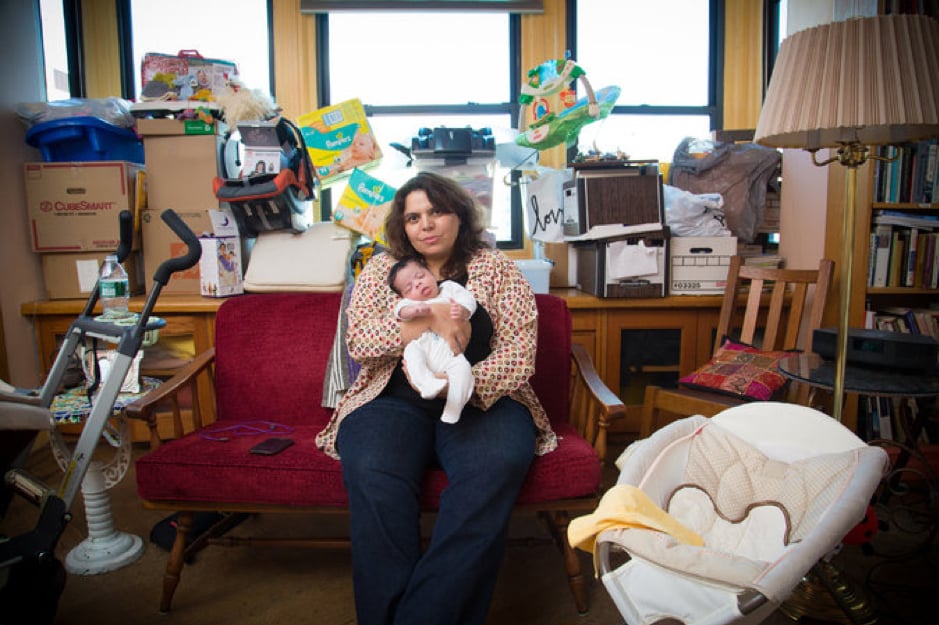 Judith Helfand and daughter Theo/ Photo by Larry Ford
Judith Helfand and daughter Theo/ Photo by Larry Ford
How do you cope with both the death of a parent and the artifacts she left behind, while preparing to become a mother yourself at 50?
For documentary filmmaker Judith Helfand (“Blue Vinyl”), the answer was clear: make a movie. Incorporating 25 years of family footage chock-full of Jewish life and ritual, Helfand’s “Love & Stuff” is a very personal journey that further explores the mother-daughter relationship that she documented in her 1997 Peabody Award-winning film, “A Healthy Baby Girl.” As it revealed, Helfand was diagnosed with cervical cancer and had a radical hysterectomy as a result of her mother taking the drug diethylstilbestrol (DES) during her pregnancy.
With a crew on hand to document the Herculean and emotionally difficult task of sorting the belongings of a mother who saved everything, Helfand made a short version of “Love & Stuff” in 2014 to “combat the feelings of loneliness, fear and feeling alienated,” she told the Journal. “Making art out of pain and grief is always cathartic.”
It also provided an opportunity to shine a light on the importance of family and Jewish celebrations in her life. “Being able to go back and forth between the past and the present through old footage and past movies that I made with my mom and dad that are mostly connected to ritual — the seder, Hanukkah, the food, all the moments I had in my childhood home — speak to the importance of ritual and why we need it,” she said.
Although Helfand regrets that she didn’t take the time to sort through her mother’s things with her when she was alive, filming together over the years gave them the opportunity “to explore and understand some really painful things,” she said. “My mother didn’t really want to make those movies, but she was really happy that I did and she wanted to be present for me.”
Being present for her 6-year-old daughter, Theo, whose adoption is chronicled in the film, is the driving force in her life and prompted her decision to have bariatric surgery to lose weight and be healthier. “I am 50 years older than my kid and I have spent a lot of time worrying about how many years we would have together. How old will I be when she has her bat mitzvah? How old will I be when she goes to college? I really should be counting my blessings that I am here with her right now, to listen, feed her imagination and be as present as I possibly can.”
Doing that during a pandemic, however, is a challenge. Helfand admitted to “stress eating” while trying to home-school Theo and maintain some sense of community in a world that has gone virtual. “It’s a big part of my commitment to her, to bring her up with Jewish social justice values at the core of our life. We’ve been going to shul together since she was born. We belong to the Workmen’s Circle, which celebrates Yiddish culture and Jewish culture and all the holidays, and I realize how much I’d been leaning on that community. Without Zoom it would be a lot harder.”
“I’m still waiting for Pesach, Rosh Hashanah and Yom Kippur to feel like they did with my mom and my dad. I’ve realized that I have to embrace the fact that I’m in charge of that now.” — Judith Helfand
As seen in the film, New York City native Helfand grew up in an Ashkenazi Jewish family, celebrating all the holidays with her extended clan. She finds that without her parents, those holiday celebrations don’t feel the same. “It’s a struggle for me to create that in my home. I’m still waiting for Pesach, Rosh Hashanah and Yom Kippur to feel like they did with my mom and my dad,” she confided. “I’ve realized that I have to embrace the fact that I’m in charge of that now.”
Theo, whose birth mother is Jewish, has a mix of African, East Asian, European and Native American ancestry, which Helfand explored in her short documentary “Absolutely No Spitting.” In it, having their DNA tested provided Helfand with an opportunity to teach her daughter about the cultural aspects of her diverse heritage.
Another film, made in 2018, has taken on new relevance during the pandemic. “Cooked: Survival by Zip Code,” “explores the long-term impact of structural racism, inequity and health disparity through the lens of a terrible heatwave that took place in Chicago in 1995. Seven hundred and thirty-nine people died in one week,” Helfand said. “The city map showing those deaths is the same map of where the COVID-19 deaths are.” PBS will broadcast it on July 13.
She’s currently planning to make new short films “that take a deep dive into different topics” while setting up virtual appearances and workshops for her current releases. She hopes that “Love & Stuff” viewers take away “the importance of trying to be completely present: for your parents, for your children, for yourself and not being so afraid of the future,” she said.
“The story is personal yet absolutely universal,” Helfand summed up. “It speaks to how important it is to be close to your loved ones at the end of their lives, to be by their side and hold their hands,” as so many families affected by the coronavirus crisis have not been able to do, she pointed out. “Whether it’s in person or by Zoom or Facetime or WhatsApp, use that time to talk about stuff. Find a way to be present. And cherish the time you have.”
“Love & Stuff” is available to stream May 28-June 25 here.“Absolutely No Spitting” is available to watch here.





















 More news and opinions than at a Shabbat dinner, right in your inbox.
More news and opinions than at a Shabbat dinner, right in your inbox.